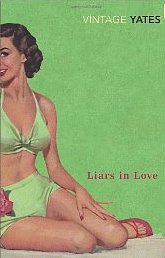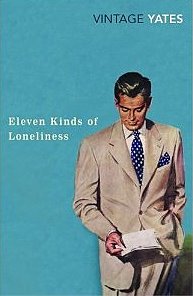
photo by Jayel Aheram
by Alex Mair
Richard Yates remains little-known outside of a small circle of passionate readers despite the success of his novel Revolutionary Road which was nominated for the National Book Award in 1960 and made into a Hollywood film in 2008. Yates received little in the way of critical attention during his lifetime, but since his death in 1992, his novels and short stories have been passed from writer to writer as examples of what is possible: a “secret handshake” according to Richard Ford.
Yates was born in Yonkers, New York in 1926. As a child, he was neglected by his mother, a woman whom biographer Blake Bailey describes as a ‘monster of egotism,’ and in later years Yates claimed to have hated her. The short story ‘Oh Joseph, I’m So Tired’ depicts her solipsistic behaviour and stretches the generic conventions of fiction to the very limit. After completing military service, Yates worked as a copywriter, then married young and wrote Revolutionary Road. His “period” is probably best described as Eisenhower’s America, and his stories are set in a white collar world of suburban cocktail parties.
The superficially simple material which provides the basis for many of Yates’s stories has led critics to dismiss his work as derivative or conventional, and his stories are free from postmodern, or even modernist, conventions. If anything, his work provides a direct link to an earlier tradition, that of nineteenth century realism. The reader only needs to look at the stories in his second volume, Liars in Love, to see the influence of Flaubert and Chekov. Stories such as ‘Saying Goodbye to Sally’ and ‘A Compassionate Leave’ provide a good example of the writer’s dexterity.
critics to dismiss his work as derivative or conventional, and his stories are free from postmodern, or even modernist, conventions. If anything, his work provides a direct link to an earlier tradition, that of nineteenth century realism. The reader only needs to look at the stories in his second volume, Liars in Love, to see the influence of Flaubert and Chekov. Stories such as ‘Saying Goodbye to Sally’ and ‘A Compassionate Leave’ provide a good example of the writer’s dexterity.
Yates’s strict adherence to naturalism has led critics to dismiss his work as looking backward, not forward, but this is a crude and reductive interpretation. His female characters, for example, are complex and multi-dimensional. Few writers have written so well or with as much pathos about the female mystique as Richard Yates. April Wheeler is but one of the many thwarted and ultimately defeated characters in his work, while the mother in ‘Oh Joseph, I’m So Tired’ is written with a complex combination of sympathy and condemnation.
If Yates has written so well, then, and has inspired such passion among other writers, why has his work been ignored for so long? Yates repeatedly tried to publish his short stories in The New Yorker, seemingly the perfect home for his work, yet all of his two dozen submissions were rejected. While many of Yates’s contemporaries, writers like John Updike and John Cheever, were handsomely rewarded for their chronicles of suburban life, Yates achieved no such success in his lifetime. The characters in his short-stories are not sexy, and his stories do not titillate. Neither are his stories overtly funny, like many of Cheever’s best. This is possibly a clue as to why Yates did not achieve the same critical recognition or financial rewards. He died in poverty in 1992. Nine years later, The New Yorker finally published Yates’s story ‘The Canal’.
 For those approaching Yates for the first time, Eleven Kinds of Loneliness, his first short-story collection, published in 1961, provides the supreme example of his eye for the everyday shortcomings of his characters. ‘The Best of Everything’ and ‘A Glutton for Punishment’ are two of the strongest stories in the collection, but the best story is ‘Builders’, a delicate and masterly example of first-person narrative. Honest writers are rare, and accomplished writers are rarer still. The career of Richard Yates shows us that these two qualities need to coexist as one, though even then, there is no guarantee of success.
For those approaching Yates for the first time, Eleven Kinds of Loneliness, his first short-story collection, published in 1961, provides the supreme example of his eye for the everyday shortcomings of his characters. ‘The Best of Everything’ and ‘A Glutton for Punishment’ are two of the strongest stories in the collection, but the best story is ‘Builders’, a delicate and masterly example of first-person narrative. Honest writers are rare, and accomplished writers are rarer still. The career of Richard Yates shows us that these two qualities need to coexist as one, though even then, there is no guarantee of success.


Thanks, Dora. It was an absolute joy to hear the man himself. Gave me goosebumps. I will pass on the link to fellow Yates fans!
My pleasure Juliet! After posting, I realized I hadn’t provided the link. Well I’m still having problems inserting a link so the web page address will have to do…http://www.richardyates.org/bib.html
The audio is of Richard Yates reading “The Best of Everything.”
Enjoy.
I first heard of Richard Yates when the movie Revolutionary Road first came out. I made a mental note to pick up his book and forgot all about it. After reading this post, I looked him up and found an internet site that has audio of him reading one of his short stories. What a treat! I will definitely have to pick up his works pronto. And yes Juliet, I love Mad Men too.
I haven’t heard the live reading – will search that out asap. Thanks for the tip-off, Dora!
Great to see something about Richard Yates on Thresholds. An MA colleague introduced me to Yates a few years ago. Revolutionary Road is the most astonishing, compelling, heartbreaking novel imaginable. I think there’s humour in there, too. Frank Wheeler is so painfully self-aware, it did make me laugh. He thinks, for example, ‘the very act of sitting on a coffee table seemed an original and wonderful thing to do.’ Ouch.
When I bought the collected short stories, I read them very slowly because it was too depressing to think there would never be another new Richard Yates short story to discover. (Unless there are hidden manuscripts lurking… we can hope.)
True, his work is very autobiographical, and there’s a sense of knowing what you’re going to get – the self-absorbed, flighty mother, the tortuous suburban cocktail parties, the intrigues and flirtations of office life. But he does it so well. If you like Mad Men on TV , you will LOVE Richard Yates.